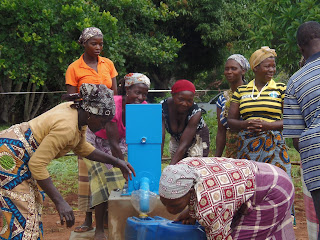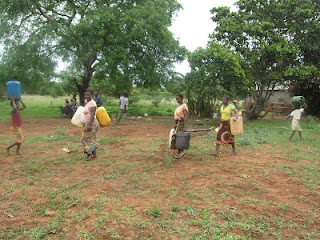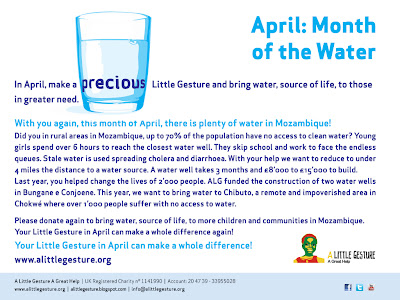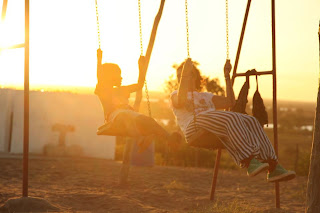When we arrived, we were received in a very organised way by the children and the teachers. They were all waiting for us and started singing welcome songs the moment we walked into the school. Afterwards, they sang to us other songs and told us 2 stories as the teachers helped along. 'Mana Carla', from the UPG team (and on her first visit to the ground) also sang along and added a choreography which the children attentively watched with a smile in their face that makes one want to hug them with tenderness!
The school has 2 class rooms with wood chairs and chalkboards, an admin room, an entrance that works as a temporary canteen, and a small kitchen where the Cook serves the food to the plates, and a girl's toilet. Outside, there is the full kitchen and a boy's toilet.
We were there during lunch, which was maize (chima) and beans that day. Everyone ate what they had in their plate and there were no leftovers! Here, the little you give, be it food or just small tickles, has a dimension of comfort and joy expressed in large smiles, a look filled with curiosity and a face full of tenderness from each xinwanani (child in Changana)
By Mana Carla
Sunday, April 28, 2013
Tuesday, April 23, 2013
Water - a basic human right!
Did you know?
Studies by the WHO / UNICEF in 2008 revealed that when people are forced to walk for over 30 minutes for one single load of fresh water, they end up compromising their daily water consumption. The difficulties of the task makes them transport less water that adequate for their daily needs: drinking water, food preparation and personal hygiene, all below desirable standards.
When drinking water is not easily available, the burden falls on women to procure it, from far out places and under vast expense of time and physical effort. Young girls that skip school, young mothers that cannot take care of their children, family crops left uncared for.
Access to Water is a Human right.
On 28 July 2010, through Resolution 64/292, the United Nations General Assembly explicitly recognized the human right to water and sanitation and acknowledged that clean drinking water and sanitation are essential to the realisation of all human rights.
This April, bring water, source of life, to the impoverished communities in Mozambique.
Access to Water is a Human right.
On 28 July 2010, through Resolution 64/292, the United Nations General Assembly explicitly recognized the human right to water and sanitation and acknowledged that clean drinking water and sanitation are essential to the realisation of all human rights.
This April, bring water, source of life, to the impoverished communities in Mozambique.
APRIL, THE MONTH OF THE WATER AT ALG
Donate Now! http://tinyurl.com/
Saturday, April 20, 2013
Back to Mozambique
This is the time of the year when UPG/ALG Management flies over to Mozambique to spend time with the Partners, Technicians, local authorities, and more importantly, with the children.
The trip is always planned efficiently to include all the projects but it is always an emotional journey. This is the time to see dreams fulfilled, to see with our own eyes the impact in each one of the lives we manage to reach and to experience the gratitude from those who have so little. It is also the time to see everything else we still have to do – new cases and old cases. It is a time to plan the future and to look back with a critical eye – what went right, what went wrong. But this year the trip is going to have an additional dose of emotion. After the January floods the devastation and the needs are greater than before. A major part of this trip will also be spent to assess the damages and to decide the allocation of the reconstruction fund financed by so many generous donors. Among other plans we will look into huts, fields, equipment and school reconstruction.
This year the trip will also be special because it is the first time “Mana Carla”, management assistant, will be on the ground. She will be accompanying Ana, the Sponsoring and Operations Director and they have an overbooked schedule.
Hoyo hoyo to the ones coming, together for the children!
The trip is always planned efficiently to include all the projects but it is always an emotional journey. This is the time to see dreams fulfilled, to see with our own eyes the impact in each one of the lives we manage to reach and to experience the gratitude from those who have so little. It is also the time to see everything else we still have to do – new cases and old cases. It is a time to plan the future and to look back with a critical eye – what went right, what went wrong. But this year the trip is going to have an additional dose of emotion. After the January floods the devastation and the needs are greater than before. A major part of this trip will also be spent to assess the damages and to decide the allocation of the reconstruction fund financed by so many generous donors. Among other plans we will look into huts, fields, equipment and school reconstruction.
This year the trip will also be special because it is the first time “Mana Carla”, management assistant, will be on the ground. She will be accompanying Ana, the Sponsoring and Operations Director and they have an overbooked schedule.
Hoyo hoyo to the ones coming, together for the children!
Wednesday, April 17, 2013
Your two new water wells in Bungane and Conjoene
In 2012, YOUR support allowed ALG to finance the construction of two new water wells, now
providing clean water to over 2,000 people in Bungane and Conjoene.
Two new water wells were drilled in Bungane
and Conjoene in the impoverished Gaza province of Southern Mozambique, to a depth of 80m and 100m each. These were outfitted with dependable
BluePump® hand pumps.
 |
ALG's new water well in Bungane, inaugurated February 2013
at a cost of £11'500
|
Why is access to clean water so important in this region?
- Clean water and sanitation improves health
and prevents debilitating diseases
- Improved water access improves nutrition by
supporting subsistence farming
- Water shortage perpetuates poverty restricting
work and study opportunities
- Collecting water falls on young girls who
drop off school further hindering gender equality
With you again, this April, there is plenty of clean water in Mozambique!
APRIL, THE MONTH OF THE WATER AT ALG
Donate Now! http://tinyurl.com/
Monday, April 15, 2013
Water Changes Everything!
Did you know that...
- The lack of water systems is one of the major obstacles to eradicate poverty in Mozambique. The access to drinkable water is still well below the needs of the Mozambican population. The most affected are the ones living in rural areas.
- In Mozambique only 30% of the population has access to drinkable water, against 72% in the urban areas, according to data from the National Directorate of Water.
- The population walk for long distances to look for water sources. Walks of 20 kilometres a day are not a rare case.

- A study performed by the WHO / UNICEF (2008) observed that when people are forced to walk for more than 30 minutes, for a single collection and transport of water, they compromise their daily consumption of water, carrying less water than the necessary to satisfy the family’s basic needs (drinkable water, food preparation and hygiene). When drinkable water is not directly available, women are more prone than men to take over the chore of collection and transport drinkable water from a remote location.
- The unsafe water consumption and the low levels of sanitation increase the transmission of diarrhoea (including cholera), trachoma and hepatitis.

- Less than a third of the families in the rural centre and rural North have access to safe water sources, and the rural areas seem to fall more and more behind in relation to the rest of the country.
Every Little Gesture counts! And yours can make a difference.
With you again, this April, there is plenty of clean water in Mozambique!
APRIL, THE MONTH OF THE WATER AT ALG
Donate Now! http://tinyurl.com/
Friday, April 12, 2013
Smiling for Mariana at the CRPE Orphan Centre
 "Since I arrived here at the CRPE Orphan Centre and I met the children, they started calling me “Sister Mari”. As the time passed I started feeling even more close to them. The first months were not easy, the normal adaptation of a local volunteer in the field did not happen for us. From the first minute we had to deal with basic needs, take care of human lives and make everything possible to support the whole community.
"Since I arrived here at the CRPE Orphan Centre and I met the children, they started calling me “Sister Mari”. As the time passed I started feeling even more close to them. The first months were not easy, the normal adaptation of a local volunteer in the field did not happen for us. From the first minute we had to deal with basic needs, take care of human lives and make everything possible to support the whole community.
In these moments we are overwhelmed by a strength coming out of nowhere and we are ready to help. The few moments we thought about leaving was when we feared for our own lives and watched our meagre resources ending. Besides this we did not felt it would be fair to have the chance to abandon a situation like this when no one else had that option.
The children, the main focus of my mission, are now part of my daily life, like everyone else in this country; they have wonderful smiles and an impressive power of acceptance and life force.
I feel at home."
"Sister" Mariana
Mariana travelled as a volunteer with our sister-charity UPG Portugal to Chinhacanine near Chokwe, Mozambique, days before the violent January floods that destroyed much of the Chokwe and Xai-Xai areas.
Chibuto, a remote area around Chinhacanine, is the the target location for ALG's next water well in Mozambique.
APRIL, THE MONTH OF THE WATER AT ALG
Donate Now! http://tinyurl.com/
Wednesday, April 10, 2013
Friday, April 5, 2013
Feeling at Home in the Mozambique Floods
“Many asked if I loved it...one cannot love calamity...pain, suffering and
wounds … but I did love the experience, the people, the country because even in the hardest moments I always had a smile here and there... thank you Mozambique...
I thank you, as despite the initial mess I always felt at home, I was received as a daughter, I took care of you like my own, I overcame the toughest moments and kept the good ones close to my heart …
I did not go in the “worst” moment for you but I think everything happens for a reason … I came back with an overflowing heart.
Tá tá! Sister Sara”
Sara F. travelled as a volunteer with our sister-charity UPG Portugal to Chokwe, Mozambique, days before the violent January floods that destroyed much of the Chokwe and Xai-Xai areas.
Help our emergency appeal by making your donation here
Every Little Gesture Counts!
Wednesday, April 3, 2013
Mozambique Floods - Local ALG Report on CRPE, Chokwe
| Basic items such as beans and flour were transported to the CRPE in small barges |
"My experience... Considering we arrived to the CRPE Orphan Centre and had to face a calamity situation our priorities and goals were changed. Because there was no power to extract water from the well our main concern was to solve this issue for the almost 6000 displaced people around us in Chinhacanine. So we started to work on the following:
1. Distribution of water from the well, possible with the use of generators made available by engineering company Opway, with operations in the vicinities. Control of schedules and amounts distributed.
| The water well at the makeshift refugee camp in the CRPE |
2. Contact the head of the community to always have someone in charge near the generator and another person near the well (an almost impossible task) to avoid possible thefts.
3. Organize lists for the neediest, establish priorities to keep them in tents, which were also made available by Opway.
4. Medical support through first aid care and distribution of medication.
5. Distribution of milk to new-born babies.
6. Distribution of basic baskets to the elder and children, delivered in hand at the CRPE Orphan Centre.
7. Gather the needy and displaced people to have meals at the CRPE Orphan Centre.
8. Perform continuous “inspections” to the refugee camp to try to identify the more pressing needs and assess if besides the malaria outbreak there was a possibility for a cholera outbreak. Try to control the diseases to the maximum.
9. Organize with the help of the Médecins sans Frontières the location of latrines to control sanitation.
10. Assessment of the families of children that attend the CRPE, and also proceed to the distribution of basic baskets to the more needed ones.
11. Monitoring of the children who attend the CRPE, after the floods, who went back to normal functioning.
Sara M. travelled as a volunteer with our sister-charity UPG Portugal to Chokwe, Mozambique, days before the violent January floods that destroyed much of the Chokwe and Xai-Xai areas.
Help our emergency appeal by making your donation here
Every Little Gesture Counts!
Subscribe to:
Posts (Atom)


